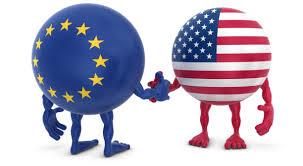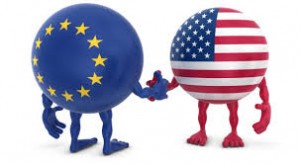Transatlantic Trade and Investment Partnership (acronym TTIP) is a bilateral trade agreement between European Union and the United States of America. The aim of this agreement is to regulate and synchronize trade between the two states. It aims to reduce tariff barriers to zero and non-tariff barriers by 25%-50%.Negotiations regarding the agreement are taking place between the European Commission (on European Union’s behalf) and the Office of the United States Trade Representative (on United States’ behalf).
Approximately 60% of the world GDP is facilitated by the United States and European Union together. The two partners together make up 33% of the world trade in goods and 42% in services. The implementation of this agreement will lead to the formation of the largest free trade zone ever, accounting for 46% of the world GDP. Moreover, the European Commission has reported that both partners would gain tremendously from TTIP. The European Union’s economy is said to increase by 120 billion Euros and United States economy by 95 billion Euros.
TTIP will not only increase employment with respect to exports, but will also create a market with cheaper goods and services. Moreover, according to a study by the Centre for Economic Policy Research (2013), TTIP would raise the standard of living of families in Europe as a result of decline in price and increase in wages.
However, fears regards the agreement have been mounting. People feel that the agreement would lead to extensive privatisation in terms of the US providing UK with critical public services such as transport, health and education. Another primary fear is that this would lead to a significant decline in quality standards, for example while EU doesn’t permit cosmetics which have been tested on animals, the US does.
TTIP would also lead to the creation of ISDS, acronym for Investor-State Dispute Settlements. This will allow various corporations to sue governments in case of loss caused (supposedly) by policies implemented like them. The fear lies in the fact that, this would leave a lot of power in the hands of multinationals which could lead to them controlling the government. There is a lot of controversy surrounding the agreement however, one hopes for a good outcome.
Click here for government certification in Accounting, Banking & Finance





23 Comments. Leave new
It facilitates in the generation of more employment opportunities, by way of eliminating trade barriers , indeed a great job very well written
Very informative article 🙂
very new and different work…
In case ISDS would be implemented and multinationals be allowed to charge against the government for loss caused, won’t it create lots of chaos and also, it would hamper growth. Usually, policies are for the general benefit and revenue collection, etc. Would it not affect resource inflow?
new and informative
Good job
Informative and well expressed. 🙂
Learnt a new term?
Very wel articulated. Learnt something new.
Quite informative and well-presented! Good work!
Its very well codefied
Its something new for me by this was well researched and the language was so simple that i was able yo understand the concept behind it very well . 🙂 .
Keep it up .
Well chosen topic.
Free trade is extremely important for the development of any country
Very well written!
Hey informative
nice one
Well written, and very informative 🙂
Sushmita, I personally feel that the primary objective of ISDS is to create a transparent and secure system for MNCs considering their role in forward and backward linkages in our country. And hence, having created such an environment inflow will in fact increase several fold. The idea is to attract more companies by giving them the leverage of ISDS. Moreover, when it comes to chaos, one cannot say its depends primarily on the efficiency of the parties at hand.
perfectly informative
Great efforts
Very well written article but I also want to inquire ain’t there any limitation or check on ISDS ? Because though it gives leverage , it is costing the economy on basis of stability and might decrease the estimated employment by the agreement.
Great article!
very well written article